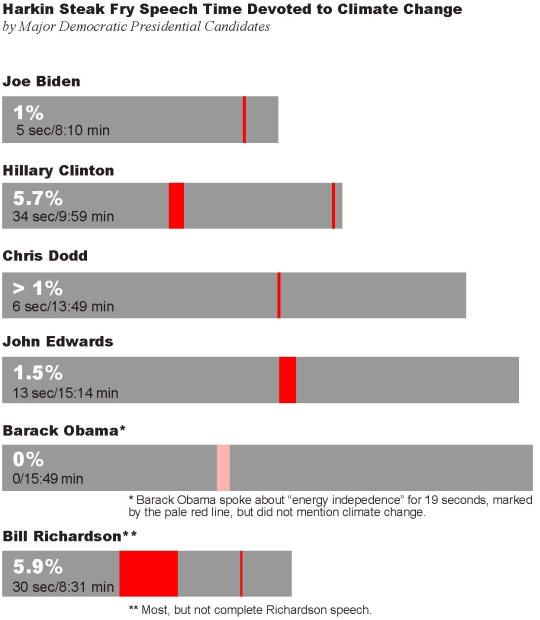The difficulty with assessing candidates by how they address climate change is that policy statements and tailored speeches give little insight into the relative importance each candidate places on global warming as compared to other issues. It is particularly difficult to distinguish between Democratic candidates, who employ an almost identical language of urgency when addressing environmentalists.
Tom Harkin, senior Senator from Iowa, hosts an annual barbecue. The September 16 event drew six major Democratic candidates — Joe Biden, Hillary Clinton, Chris Dodd, John Edwards, Barack Obama, and Bill Richardson — who spoke between 8-15 minutes each to an attentive crowd of 12,000. Each candidate’s speech is displayed in the accompanying chart (below the fold) in the form of a bar, with red indicators of when and for how long climate change was addressed (CNN feed available at YouTube). It should be noted that when the issue was raised, the Harkin Steak Fry crowd responded enthusiastically, so there is little reason to think that candidates trimmed their climate sails for this particular venue.

The chart demonstrates that climate change remains a minor issue for the major Democratic Party contenders for president, who devoted, on average, just 15 seconds — or 2.6 percent of their speeches — to the problem.
Quantity does not equal quality, of course, and John Edwards’ ringing call, “It is time to be patriotic about something other than war,” is far more memorable then Bill Richards’ “I will ask every American … to be more careful when it come to appliances,” even though Richards dwelt nearly three times as long on climate as Edwards.
The upshot? While climate change has jumped several rungs up the political ladder, to a point where even Republicans must treat it with kid gloves, it is the kind of attention paid to any other disciplined interest group, worthy of mention and a few passionate words somewhere late in the stump speech — after the main points have been made.


